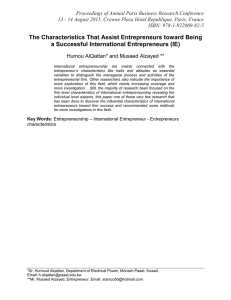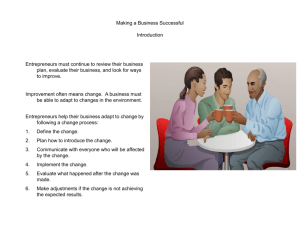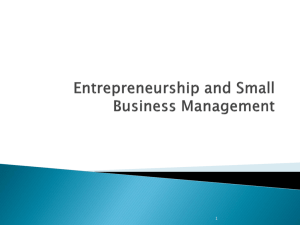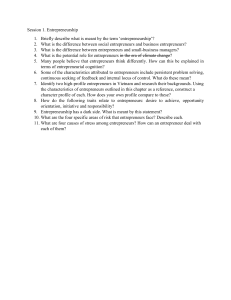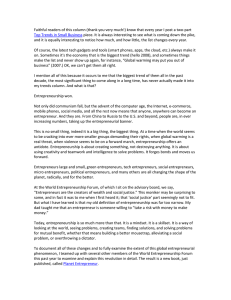BUSINESS MANAGEMENT
advertisement
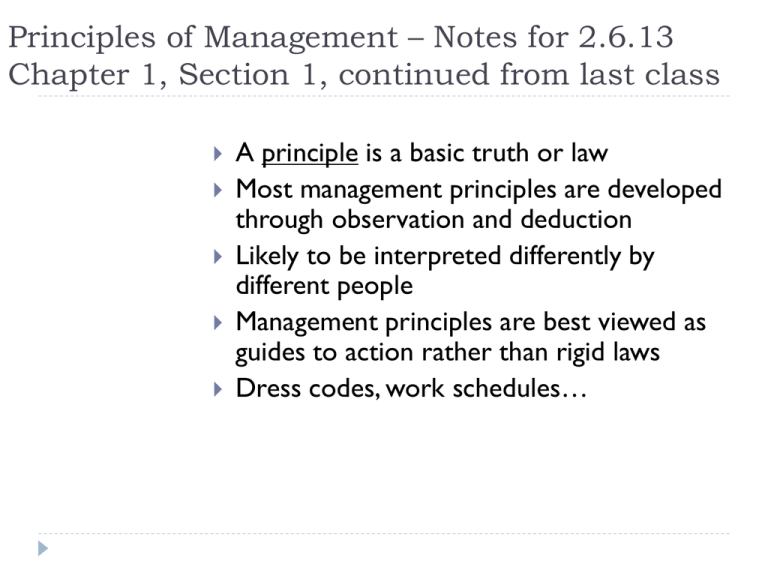
Principles of Management – Notes for 2.6.13 Chapter 1, Section 1, continued from last class A principle is a basic truth or law Most management principles are developed through observation and deduction Likely to be interpreted differently by different people Management principles are best viewed as guides to action rather than rigid laws Dress codes, work schedules… Why so few women and minorities? As recently as the 1960’s encouraged to hold support roles (e.g. secretaries, teachers, waitresses, sales clerks) Glass Ceiling: invisible barrier that prevents women and minorities from moving up in the world of business an unofficial but real impediment to somebody's advancement into upper-level management positions because of discrimination based on the person's gender, age, race, ethnicity, or sexual preference. Read: Breaking the Glass Ceiling…”Avon Case Study” Pg. 6 in text Be ready to discuss next class! BUSINESS MANAGEMENT Entrepreneurship & Small Business Chapter 1 – Section 2 Is this for YOU? If you were to start your own business or company, what would it be and why? Would you rather join a company already in existence and work your way up? Why? Professional Manager Professional managers are paid to perform management functions within a company Senior, middle, and supervisory managers Receive salaries for the work they do Work for companies, but do not own them What are entrepreneurs? People who launch and run their own businesses Read Case Study… “Nestlé's Sweet Organizational Structure” Pg. 11 Be ready to discuss next class! Entrepreneurs Entrepreneurs – people who launch and run their own businesses Pros and Cons? Much riskier than being professional manager Can be more rewarding than working for a company Opportunity of high income and personal accomplishment Usually more independent Often less formal education Make own decisions own boss Long hours and lots of decisions about all aspects of a business Risk of losing entire personal investment Create exciting developments/innovations Activity Are you a professional manager or entrepreneur? Take this quiz to find out! http://bcentral.thirdwaveresearch.com/bulletin/AptitudeTe st.html Types of Ownership Sole proprietorship Partnership Corporation Franchise Entrepreneurs in Large and Medium-Sized Businesses Businesses want managers to think more like entrepreneurs they must find ways to support and encourage people to develop new products and services Entrepreneurship within a large or medium-sized company is often called intrapreneurship Intrapreneurs take risks, but not with their own investments What is a “Small” Business? A small business is a company that is independently owned and operated, and serves local areas or customers all over the world Small Business Administration (SBA) government agency that lends money to small businesses Considered “small business” if it employs fewer than 100 people More than 99% of businesses in the US are small businesses The Importance of Small Business Play an important role in the U.S. economy employ millions of workers sell billions of dollars of products and services Tend to produce more innovations than larger businesses Industries Attracting Small Businesses Service - medical and dental care, repair shops, hair cutting, restaurant meals, dry cleaning, etc. Distribution - industries that are concerned with moving goods from producers to consumers retailers, wholesalers, transport companies, communications companies Production - construction, mining, and manufacturing companies NOTE: these industries usually require a large initial investment. Why Do Some Small Businesses Fail? lack of experience - around 40% of all small businesses are started by people who have little experience in their field lack of money - don’t have enough money to get them through the growing pains of starting up a business; some businesses don’t make a profit for many years after starting bad location - many people try to save on rent and find they have a good deal on a bad location Why Do Some Small Businesses Fail? mismanaging inventory - carrying improper merchandise is a drain on business; not having good controls poor credit-granting practices - the pressure to sell merchandise on credit is great, but credit sales create many other problems which many firms can’t handle poorly planned expansion - many businesses expand too quickly Famous Entrepreneur Facebook Page See handout on my website This is DUE on Friday, Feb. 8th at the END OF CLASS!
